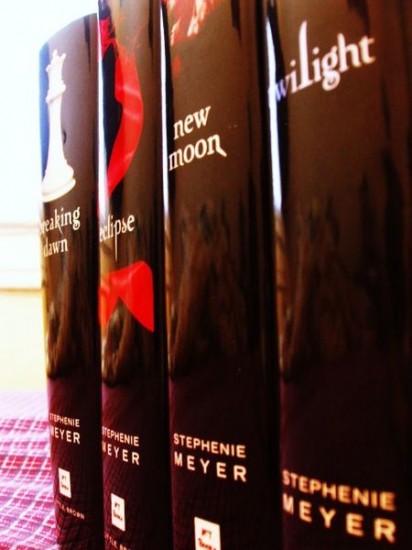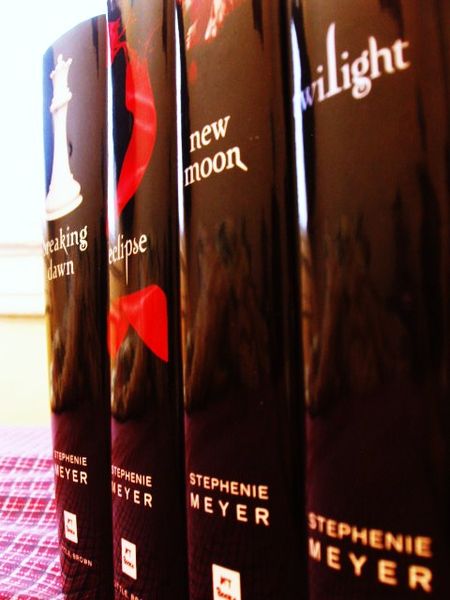
Image from Wikimedia Commons
On Monday, November 14, just a few days before the premier of Twilight: Breaking Dawn, Shannon Keating ’14, a member of SafetyNet, a domestic violence awareness group, and Darcie Folsom, Coordinator of Sexual Violence Education, hosted an event in the Women’s Center to discuss dating abuse and stalking in the Twilight series.
Keating explained that she “wanted to use this series as an example of domestic abuse and dating violence because the relationship in the series is something to which readers are supposed to aspire above all else, even though the relationship hits basically every mark on an abuse checklist.”
The event, “Breaking Down Breaking Dawn,” began with a sequence of film clips from the first three films in the series. These clips highlighted examples of dating abuse and stalking in the movies. One of the movie scenes shows Jacob kissing the main character, Bella, against her will, and she hurts herself trying to get him to stop. When Bella arrives home injured, her father’s response is to congratulate Jacob.
These clips elicited laughter from an audience comprised of both fans and critics of the series because the unhealthy aspects of the relationships appeared blatantly obvious outside of the context of the plot of the series.
The examples sparked an animated discussion on the dating violence, domestic abuse and stalking depicted in the films, leading to a general debate about unhealthy behaviors in the relationships represented by the Twilight series.
One of the main topics discussed was Bella’s lack of friends. One student noted that the only friends Bella has at the beginning of the series are those whom she eventually pushes away. Throughout the rest of the movies (as well as the books) Bella has only two friends—Jacob, who is in love with her, and Alice, Bella’s boyfriend’s sister.
The group also discussed how Bella’s main love interest, Edward, does not allow Bella to visit her only other friend, Jacob. He goes as far as to disconnect the wires of her car so that she is unable to visit Jacob.
Keating mentioned that each of Bella’s love interests threatens suicide to manipulate her. Edward always says to Bella that he cannot live without her and when he believes Bella has died, he attempts to kill himself. On the other hand, when Jacob discovers that Bella is getting married, he threatens to go angrily to a battle in order to get himself killed.
What the story does not explicitly discuss, while Keating’s discussion did, is that Jacob’s threat is really a form of manipulation – Bella allows herself to be controlled by Jacob, going so far as to beg him to kiss her.
Keating argued that the series’ focus on the importance of having a boyfriend is demonstrated by the remarkably bleak chapters devoted to the months following Edward’s breakup with Bella. In fact, what follows these chapters is Bella’s borderline suicidal drive to engage in life-threatening behaviors in order to induce hallucinations of her ex-boyfriend. Another student brought up the fact that Bella only really awakens again when she begins to have feelings for another boy.
Cara Einbinder ’14 thought the event was lacking in male opinions. Einbinder explained that she wished that “more guys had been there. Male opinions would have been interesting to contrast with the female opinions,” though she still found the discussion to be both interesting and informative.
Another girl in attendance mentioned that the problem in the depiction of Edward and Bella’s relationship lies in the fact that many young girls read these books and idealize this relationship—they all want an Edward, but that is the perfect example of the kind of relationship that they should avoid.
The goal of the event was to encourage people to become conscious consumers. “I’m hoping to inspire people to look at the media they are consuming from critical perspectives,” Keating said. “Being a conscious consumer is key. There is so much racism and sexism inherent across all strands of media, and if we don’t stop to acknowledge it we’re going to let it control us.”
Keating further explained, “we can be fans of these problematic things, definitely, but we just need to recognize where the problems are. Hopefully one day we don’t have to be stuck with loving fiction that glorifies obsession, sexism and violence.” •











Oh please. You may want to look a bit deeper at the elements surrounding this particular pair of FANTASY teenagers who are strangely drawn to each other in a fantasy world. And give girls and women more credit for knowing the difference between fiction and reality, to worry they may think they live in a world of vampires and werewolves is simply insulting. Just a few other issues addressed in the series are: living with divorced parents, loss and grief, self-discipline, self-understanding, family love and loyalty, abstinence in the face of peer pressure, self-respect, and generosity.
Time to refocus on what is really affecting kids out there. Twilight is a fantasy series, and the relationship story it includes is strikingly similar to Romeo and Juliet, West Side Story, and countless movies and books read and seen by all ages. The four books include other significant plot points, action, and plenty of discussion having nothing to do the relationship. Why criticize Twilight when this is the kind of story we teach in schools? In fact, the main characters in Twilight are all stubborn and strong in their own ways, and all struggle with eventually learning to compromise and care for each other, including the males. That is not such a bad relationship lesson. This story appeals because yes, the main characters are young and inexperienced, and we see them making mistakes and learning how to work their issues out. In the background, there are also strong, kind, adult role models in their life.
If you want something to get worked up about, take aim at parents who don’t act as good relationship role models. Take aim at ridiculous magazines for girls and women, and their so called “journalism”, and video games. Then take aim at the popular music industry which actively bombards kids mercilessly with confusing images and statements that seriously (because of the effectiveness of visual media) influence kids and sends out blatantly misogynist messages to girls and boys both. Age-inappropriate, unsupervised TV is something bombarding kids for thousands of hours a year. It is pervasive. Twilight is not.
I am a teacher, and would rather have my 13-year-old daughter read a Twilight book and discuss it with me than have her watch Rihanna degrade herself repeatedly in a video at a friend’s house, or be berated by a boy at school repeating horrible words about “girls” from a rap “song”.
Laura, I think you’re missing the point. Putting this kind of relationship into a fantasy world doesn’t make it acceptable. If Harry Potter had such troubling relationship dynamics to which we’re apparently supposed to aspire, we’d be criticizing that, too, and the fact that they’re all witches and wizards wouldn’t make a difference. Instead Harry Potter puts forth much more positive examples of love and loyalty, which is a major reason why they’re so successful — it’s not exclusively the wish fulfillment aspect, which is often the main draw to Twilight. In fact, I’m struggling to think of how Twilight presents any constructive ideas of the list of issues you mentioned. Living with divorced parents? Bella basically divorces herself from two parents that love her very much at the age of eighteen so she can DIE. Loss and grief? Her response to Edward leaving is to become such a shell of a person that there are months on end in which the author has judged that there is actually NOTHING TO SAY ABOUT HER. And to think that these books teach self-respect at all — meaning respecting YOURSELF without needing anyone else to define you — is kind of delusional.
I would also argue that there is basically nothing in Twilight that does not revolve completely and utterly around the Edward/Bella relationship. All other plot points, if there are any, develop from that. Nearly all the character motivations? Dedicated to that relationship. And when you combine that laser focus with the wish-fulfillment aspect I mentioned, how can it not be dangerous for the young girls that read it? I mean, clearly you think that media has an effect on adolescents — I’m just having trouble understanding your logic for why Twilight is exempt from that responsibility.
And finally, part of your argument is that Twilight isn’t pervasive? Honestly? For a franchise that barely seems to need any advertisement thanks to the single-minded devotion of its fans, there sure seems to be a lot of it. Everywhere. Personally, I find Twilight to be shoved in my face far more often than any video games OR popular music with misogynist tones.
Laura,
Unfortunately though a lot of girls DO idealize the poor relationships shown off in this book series. I think you could at least, as an alleged teacher responsible for children, that the promotion of these sorts of ‘casually’ abusive relationships is not good. As a teacher, you should be aware that these sorts of abuse in teen relationships is on a scary high right now.
Sure, Twilight echoes Romeo & Juliet, but Romen & Juliet was written in the 16th century and is hardly a great role model for children either. The difference is that kids know R&J is old, and are taught that that kind of relationship is stupid. Twilight is set in modern day, and is (hopefully not) taught as literature and discussed in such a way. However, I wouldn’t be surprised if your lessons were so awful that you prattle on about how great the message of teen love is in R&J.
You say to ‘Take aim at ridiculous magazines for girls and women, and their so called “journalism”, and video games’, and yeah, girl/women magazines are pretty stupid, and guilty of the same Twilight stuff too. However, why is ‘video games’ even there? It’s not even on the same subject as the rest of the sentence. You affix it to the end of the sentence seemingly as an after-thought, seemingly unaware of how stupid it makes you come across. You shout about video games for no actual reason, and it just makes you seem like a moron who doesn’t understand anything. Video games are a media, and it’s just as silly to just say ‘oh, and blame movies by the way’.
VIDEO GAMES ARE DESTROYING THE CHILDREN OH NO.
I look forward to you retiring in a few months from teaching as you are clearly a horrible influence on the youth of today becauser you ‘teach’ them bad relationship advice and don’t even understand the media they’re growing up with, instead shouting ‘Witch, witch’ like some sort of Abigail Williams but really old.
I absolutely loved the article, Amber! What a great approach to teaching this literature- so interdisciplinary, too.( As you know, it connects social/psychological fields with literature.) Keating addresses the idea that we are attracted to some unhealthy relationships and provides a way to reflect on how this occurs. She demonstrates how obvious the “sickness” is when taken out of the story’s context.
The detail you mentioned about the audience’s reaction was especially interesting. While considering my classes at the University of Puerto Rico, I realized that this same uncomfortable laughter dynamic happens when I discuss homosexuality in class- especially the Kinsey report. However, when the students find out that my mother and her female partner were murdered in a hate crime, they quickly realize the need to reflect about society’s influence on our attitudes.
Though I am against censorship in all of its forms, I celebrate the trait of becoming a resistant reader. Remember the slogan, “Question authority”? I include questioning literature in this conception as well.
a load of crap you idiot